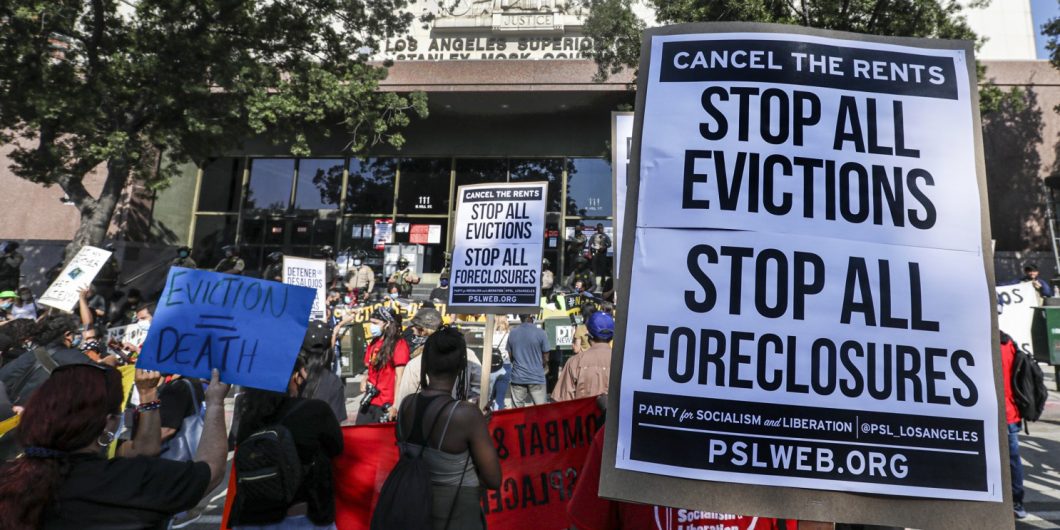Do Eviction Moratoriums Violate the Contract Clause?
The Supreme Court recently held that the Biden Administration’s extension of a moratorium on evictions to combat the pandemic was beyond the limited authority of its Center for Disease Control and Prevention. But twelve states have used their own police power to keep eviction moratoriums in place. These moratoriums are not permitted under the original meaning of the Constitution. They also represent an immoral imposition of social costs on a small class of people—owners who rent out their property. And they will harm people of modest means in the future by discouraging investment in affordable rental property. The continuing popularity of such moratoriums over eighteen months after the appearance of Covid-19 shows how far we have traveled from a key decision of our Founders—to put vested rights, like contractual obligations, beyond the power of government to destroy.
The Contract Clause
The Constitution has a specific provision that prevents states (or their localities operating under state authority) from interfering with existing contracts to the benefit of one party at the expense of the other. It expressly provides that no state may pass a law “impairing the obligation of contracts.” It is hard to argue that an eviction moratorium does not work such an impairment.
Consider the sweeping moratorium passed by the city of Los Angeles, the second-biggest metropolis in the United States. First, the moratorium declares that for the period of the Covid emergency (an emergency that is still ongoing, according to the city) and for twelve months afterwards, the tenant cannot be evicted from the rental property when he cannot pay rent due if he suffered any loss of income related in any way to Covid. The tenant also cannot be evicted for this period for other “non-fault reasons,” such as the property owner’s wanting to occupy the property himself. The law also bars eviction even if the tenant is joined by other occupants or pets that are expressly forbidden by the lease.
Under any reasonable definition of impairment, the Los Angeles eviction moratorium is a substantial one. While the rental obligation is deferred rather than eliminated, the usual requirement that rent be paid monthly reflects the recognition that deferred payments are less likely ever to be made. Moreover, the requirement that only the tenant and others designated in the lease occupy the property is designed to safeguard against the value of the owner’s property being substantially diminished by excessive wear and tear.
Nevertheless, the Ninth Circuit summarily dismissed a Contract Clause challenge to the moratorium. And it was right to do so because the controlling precedent of the Supreme Court has gutted the Contract Clause. In Home Building and Loan Association v. Blaisdell, a case decided during the Depression, the Court faced not an eviction but a mortgage moratorium. The statute provided that a mortgagor who was in default could apply to state court for an extension for the mortgage period so long as he paid a reasonable rent for the period. The statute thus took away the essential bargained-for right of foreclosure.
Although the Court had in the nineteenth century invalidated similar statutes that had diminished core contractual rights, the Blaisdell Court upheld the statute in an opinion notable for its repudiation of originalism. The Court said the statute must be considered “in light of our whole experience and not merely in light of what was said a hundred years ago.” Thus, because of “a growing recognition of public needs . . . the reservation of a reasonable exercise of the protective power of the States is read into all statutes.” Ultimately, the Court reasoned that the statute should be upheld because of the difficult economic conditions.
In one of the more powerful dissents ever written, Justice George Sutherland observed that the very arguments for state power that the majority made were also offered by the opponents of the Contract Clause at the Convention and were rejected by its adoption. The Clause had been passed to protect against debtor relief legislation adopted when economic conditions were perceived to be harsh—precisely the conditions which the Court was using to permit impairment. As Justice Sutherland dryly concluded, “With due regard for logical thinking, it legitimately cannot be urged that the conditions that produced the rule may now be invoked to destroy it.”
Even scholars like Lino Graglia of Texas Law School, who believe that the Court should defer to the legislature unless it is clear beyond a reasonable doubt that a law violated the Constitution, agree that the Court failed to follow our fundamental law in Blaisdell. The mistake in the case is best explained by the Court’s sense that previous courts had been wrong in policing state economic decisions, as when, for instance, it struck down minimum wage laws in Lochner v. New York. But the Lochner Court’s real mistake had been to wrongly read substantive protections into the requirement of due process or to find fundamental rights when they were nowhere present. The Blaisdell Court flouted the language of the Constitution in creating a general exception to the Contract Clause. Both were decisions without foundation in the text.
The larger lesson of eviction moratoriums is that the Constitution’s decisions to protect vested rights and property against democratic abrogation is morally and economically sound.
The original Constitution did not follow the progressive creed that only “civil rights” like free speech are protected against democratic majorities. Instead, a better summary would be that the original Constitution protected many vested rights, both civil and economic. As Gordon Wood observes in his excellent new book, Power and Liberty: Constitutionalism in the American Revolution, “The idea that there existed a sphere of private rights that lay absolutely beyond the authority of the people themselves was a remarkable innovation” of the Constitution. Settled contractual obligations provide an exemplar of such vested rights.
Because of Blaisdell, however, the modern Supreme Court has largely read the Contract Clause out of the Constitution where private parties are concerned. State legislation will now be upheld even when it substantially impairs a contractual relationship where the legislature “reasonably” pursues a “legitimate public purpose.” Other than laws that target a particular contract or those obviously motivated by malice, it is not clear what would fail this formulation.
The Contract Clause thus is an area ripe for revisiting by an originalist Court. Unlike non-originalist doctrines that support the federal administrative state or permit the federal government to regulate almost any economic matter, the erroneous Contact Clause doctrine has not generated substantial reliance interests. Whole structures of government and entire industries may have grown up around the regulatory regimes generated by permissive delegation. In contrast, few people are expressly relying on the state’s capacity to free them from their obligations when they make contracts. Returning to the original understanding of the Contract Clause thus does not face the substantial obstacles in stare decisis encountered in many other areas of constitutional law.
The Moral Problems of Eviction Moratorium
The Contract Clause reflects a sound political morality. The problem with eviction moratoriums is that they single out a relatively small class of people to shoulder society’s burdens. Landlords did not cause the pandemic and yet they are being forced to pay for its amelioration. If the states and localities want people not to be evicted, they should immediately pay their rent from general funds, thus diffusing the cost on everyone in the jurisdiction.
But states and localities have not generally paid landlords for their tenants’ arrears. And while the federal government has belatedly offered some rental assistance, it does not cover all of those who have been excused from timely rental payments by many of the sweeping state and local eviction moratoriums. Nor does the program provide any recompense for the breaking of the nonpayment terms of the leases, such as limitations on the number of occupants.
What makes an eviction program like that in Los Angeles particularly outrageous is that it makes no provision either to require the tenant to pay what he can or to recognize the plight of small landlords.
First, in the absence of the moratorium, most landlords would not evict people who fell behind on their rent because, thanks to the circumstances caused by Covid, they could not easily rent the dwelling to someone else. What would generally occur instead is a negotiation for some payment that would allow the landlord to make ends meet. But the Los Angeles moratorium appears to prevent eviction if any income is lost due to Covid without any requirement to make good faith attempts to pay as much as possible.
Second, many landlords themselves are people of modest means who rely on their rental income to maintain their own standard of living. But because renters are a more numerous voting bloc, moratoriums ignore the interests of even small landlords. Thus, the Covid eviction moratoriums not only burden a particular class of people, they often do so indiscriminately, sacrificing a politically powerless group for a claimed social good.
The Bad Economics of Covid Moratoriums
There is a crisis of affordable housing in many parts of the nation. And because they are popular where housing is most expensive, these moratoriums will likely deepen this crisis. Eviction moratoriums, like rent control, are a political habit that is hard to break. In many cities, like New York, rent control was justified as an emergency response to a housing shortage after World War II. Seventy years later, the “emergency” continues.
The prospect of future moratoriums makes investing in rental property less attractive and so there will be less demand for the property and consequently less housing will be built. Thus, while the eviction moratorium may help some people in the short term, it will hurt many in the same class in the long term and increase homelessness as well.
The larger lesson of eviction moratoriums is that the Constitution’s decisions to protect vested rights and property against democratic abrogation is morally and economically sound. The Constitution is designed in the words of Justice David Brewer to protect Peter Sober against Peter Drunk. In reviving the original meaning of the Contract Clause, the Court would create a steadier and more prosperous polity in the long run.



